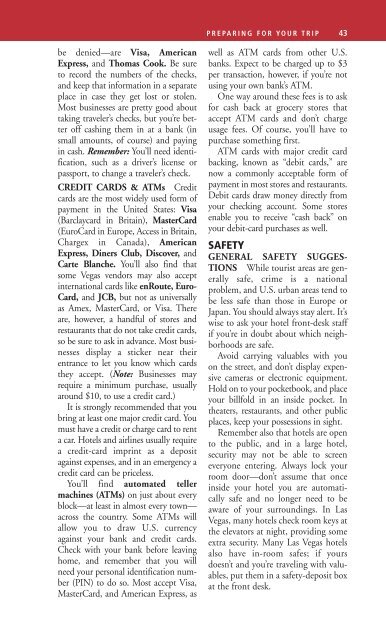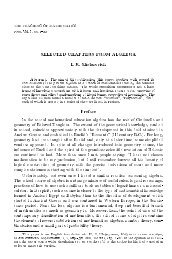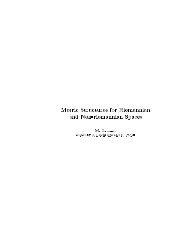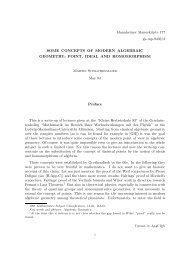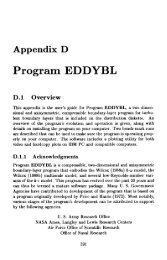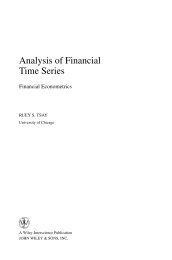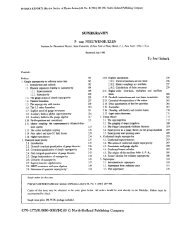Frommer's Las Vegas 2004
Frommer's Las Vegas 2004
Frommer's Las Vegas 2004
You also want an ePaper? Increase the reach of your titles
YUMPU automatically turns print PDFs into web optimized ePapers that Google loves.
PREPARING FOR YOUR TRIP 43<br />
be denied—are Visa, American<br />
Express, and Thomas Cook. Be sure<br />
to record the numbers of the checks,<br />
and keep that information in a separate<br />
place in case they get lost or stolen.<br />
Most businesses are pretty good about<br />
taking traveler’s checks, but you’re better<br />
off cashing them in at a bank (in<br />
small amounts, of course) and paying<br />
in cash. Remember: You’ll need identification,<br />
such as a driver’s license or<br />
passport, to change a traveler’s check.<br />
CREDIT CARDS & ATMs Credit<br />
cards are the most widely used form of<br />
payment in the United States: Visa<br />
(Barclaycard in Britain), MasterCard<br />
(EuroCard in Europe, Access in Britain,<br />
Chargex in Canada), American<br />
Express, Diners Club, Discover, and<br />
Carte Blanche. You’ll also find that<br />
some <strong>Vegas</strong> vendors may also accept<br />
international cards like enRoute, Euro-<br />
Card, and JCB, but not as universally<br />
as Amex, MasterCard, or Visa. There<br />
are, however, a handful of stores and<br />
restaurants that do not take credit cards,<br />
so be sure to ask in advance. Most businesses<br />
display a sticker near their<br />
entrance to let you know which cards<br />
they accept. (Note: Businesses may<br />
require a minimum purchase, usually<br />
around $10, to use a credit card.)<br />
It is strongly recommended that you<br />
bring at least one major credit card. You<br />
must have a credit or charge card to rent<br />
a car. Hotels and airlines usually require<br />
a credit-card imprint as a deposit<br />
against expenses, and in an emergency a<br />
credit card can be priceless.<br />
You’ll find automated teller<br />
machines (ATMs) on just about every<br />
block—at least in almost every town—<br />
across the country. Some ATMs will<br />
allow you to draw U.S. currency<br />
against your bank and credit cards.<br />
Check with your bank before leaving<br />
home, and remember that you will<br />
need your personal identification number<br />
(PIN) to do so. Most accept Visa,<br />
MasterCard, and American Express, as<br />
well as ATM cards from other U.S.<br />
banks. Expect to be charged up to $3<br />
per transaction, however, if you’re not<br />
using your own bank’s ATM.<br />
One way around these fees is to ask<br />
for cash back at grocery stores that<br />
accept ATM cards and don’t charge<br />
usage fees. Of course, you’ll have to<br />
purchase something first.<br />
ATM cards with major credit card<br />
backing, known as “debit cards,” are<br />
now a commonly acceptable form of<br />
payment in most stores and restaurants.<br />
Debit cards draw money directly from<br />
your checking account. Some stores<br />
enable you to receive “cash back” on<br />
your debit-card purchases as well.<br />
SAFETY<br />
GENERAL SAFETY SUGGES-<br />
TIONS While tourist areas are generally<br />
safe, crime is a national<br />
problem, and U.S. urban areas tend to<br />
be less safe than those in Europe or<br />
Japan. You should always stay alert. It’s<br />
wise to ask your hotel front-desk staff<br />
if you’re in doubt about which neighborhoods<br />
are safe.<br />
Avoid carrying valuables with you<br />
on the street, and don’t display expensive<br />
cameras or electronic equipment.<br />
Hold on to your pocketbook, and place<br />
your billfold in an inside pocket. In<br />
theaters, restaurants, and other public<br />
places, keep your possessions in sight.<br />
Remember also that hotels are open<br />
to the public, and in a large hotel,<br />
security may not be able to screen<br />
everyone entering. Always lock your<br />
room door—don’t assume that once<br />
inside your hotel you are automatically<br />
safe and no longer need to be<br />
aware of your surroundings. In <strong>Las</strong><br />
<strong>Vegas</strong>, many hotels check room keys at<br />
the elevators at night, providing some<br />
extra security. Many <strong>Las</strong> <strong>Vegas</strong> hotels<br />
also have in-room safes; if yours<br />
doesn’t and you’re traveling with valuables,<br />
put them in a safety-deposit box<br />
at the front desk.


